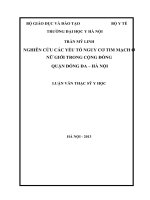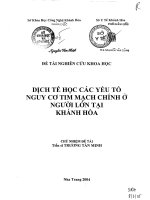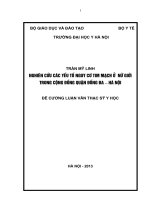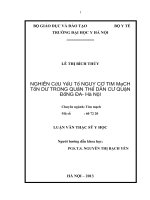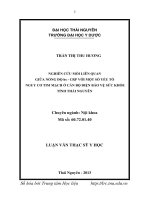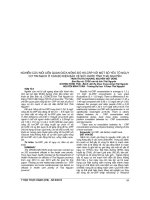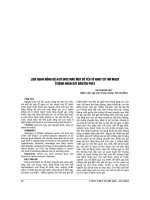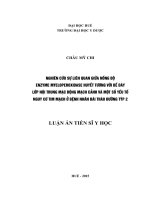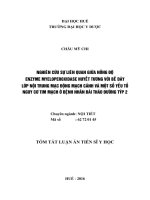Tối ưu hóa quản lý đa yếu tố nguy cơ tim mạch giải pháp viên phối hợp
Bạn đang xem bản rút gọn của tài liệu. Xem và tải ngay bản đầy đủ của tài liệu tại đây (3.31 MB, 54 trang )
<span class="text_page_counter">Trang 1</span><div class="page_container" data-page="1">
HEE HWANG, MD
Department of Pediatric Neurology Center for Medical Informatics, SNUBH
<b>TỐI ƯU HÓA QUẢN LÝ ĐA YẾU TỐ NGUY CƠ TIM MẠCH: GIẢI PHÁP VIÊN PHỐI HỢP </b>
<b>Wonjae Lee, MD MBA </b>
<b>International Healthcare Center/Cardiovascular Center Seoul National University Bundang Hospital </b>
</div><span class="text_page_counter">Trang 2</span><div class="page_container" data-page="2"><b>Nội dung </b>
<b>Các hướng dẫn điều trị rối loạn lipid </b>
<b>Các hướng dẫn điều trị tăng HA hiện hành </b>
<b>Đa yếu tố nguy cơ tim mạch </b>
-<b>Tần suất </b>
-<b>Lợi ích của kiểm soát yếu tố nguy cơ Một số nghiên cứu viên phối hợp </b>
<b>Ca lâm sàng </b>
</div><span class="text_page_counter">Trang 3</span><div class="page_container" data-page="3"><b>Nguy cơ tử vong do tim mạch tăng gấp đôi với mỗi 20/10 mmHg huyết áp tăng </b>
1. Chobanian AV et al. JAMA. 2003;289:2560-2572. Lewington S et al. Lancet. 2002;360:1903-1913.
SBP = systolic blood pressure; DBP = diastolic blood pressure.
*Individuals aged 40-69 years, starting at blood pressure 115/75 mm Hg
</div><span class="text_page_counter">Trang 4</span><div class="page_container" data-page="4"><b>Lợi ích giảm nguy áp là bao nhiêu? Phân tích gộp </b>
• MEDLINE search
• Included RCT with a minimum of 1000 Pts-yrs f/u
</div><span class="text_page_counter">Trang 5</span><div class="page_container" data-page="5"><b>Tác động của giảm HA tâm thu 10mmHg </b>
</div><span class="text_page_counter">Trang 6</span><div class="page_container" data-page="6"><b>SPRINT: điều trị chuẩn vs điều trị tích cực </b>
1. SPRINT Research Group, NEJM 2015
<i><b>Average SBP: 121 mmHg (2.9 meds) vs. 134 mmHg (1.9 meds)</b></i>
</div><span class="text_page_counter">Trang 7</span><div class="page_container" data-page="7"><b>SPRINT: kết cục chính </b>
1. SPRINT Research Group, NEJM 2015
<i><b>Hazard Ratio = 0.75 (95% CI: 0.64 to 0.89) </b></i>
<i><b> Number Needed to Treat (NNT) to prevent a primary outcome = 61 </b></i>
<i><b>(319 events) </b></i>
<i><b>Number of Participants </b></i>
<i><b>Primary outcome: CVD composite: first occurrence of Myocardial infarction (MI), Acute coronary syndrome (non-MI ACS), Stroke, </b></i>
<i><b>Acute decompensated heart failure (HF), Cardiovascular disease death </b></i>
</div><span class="text_page_counter">Trang 8</span><div class="page_container" data-page="8"><b>Kiểm sốt tích cực huyết áp có thể giảm tử vong </b>
<b>Lower rates of heart attack, heart failure, and other cardiovascular events </b>
<b>Lower risk of death </b>
<b>Lower Blood Pressure Target : Dramatic Results </b>
1. SPRINT Research Group, NEJM 2015
</div><span class="text_page_counter">Trang 9</span><div class="page_container" data-page="9"><b>Chiến lược điều trị tăng huyết áp </b>
1. //
Stage1 hypertension130-139 or 80-89 <sup>Initial therapy </sup> (ASCVD >10%) Stage2 hypertension 140-159 or 90-99 Dual-therapy Stage2 hypertension ≥160 or ≥100 <sup>Dual-therapy </sup>
:
Pre hypertension 130-139 or 80-89
Hypertension Treatment for 3 or more risk factor, no symptoms of organ damage, Diabetes, cardiovascular
disease, chronic kidney disease
</div><span class="text_page_counter">Trang 10</span><div class="page_container" data-page="10"><b>Thấp hơn là tốt hơn? </b>
1. Kang et al. Eur Heart J. 2018 Dec 6
Patient: 290,600 subjects from the NHIS Health Screening Cohort who are not taking anti-hypertensive medication
Outcomes: MACE
</div><span class="text_page_counter">Trang 11</span><div class="page_container" data-page="11"><b>Tăng huyết áp khơng được kiểm sốt tốt </b>
</div><span class="text_page_counter">Trang 12</span><div class="page_container" data-page="12"><b>Dịch tể học cho thấy LDL-C cao có liên quan đến bệnh tim mạch và các biến cố tử vong </b>
cholesterol or LDL-C resulted in more CV events
<i>1. Kannel WB, et al. Ann Intern Med. 1971;74:1-12. 2. MRFIT Research Group. Prev Med. 1986;15:254–273. </i>
</div><span class="text_page_counter">Trang 13</span><div class="page_container" data-page="13"><b>Gánh nặng bệnh tật của xơ vữa động mạch </b>
<b>SATURN Substudy </b>
<b>Baseline Percent Atheroma Volume Quartiles and Major Adverse CV Events </b>
CV = cardiovascular; MACE = major adverse cardiovascular events; PAV = percent atheroma volume. Adapted from: Puri R, et al. Eur Heart J. 2013;34:3182-3190.
<small>Baseline PAV Quartile 1 (14.78–30.73) Baseline PAV Quartile 2 (30.80–36.03) Baseline PAV Quartile 3 (36.12–41.74) Baseline PAV Quartile 4 (41.78–68.75) </small>
<b><small>7.9% </small></b>
<b><small>5.7% </small></b>
</div><span class="text_page_counter">Trang 14</span><div class="page_container" data-page="14"><b>Giảm LDL-C làm giảm gánh nặng bệnh tật do xơ vữa động mạch </b>
1. LDL-C = low-density lipoprotein cholesterol; PAV = percent atheroma volume. Puri R, et al. Am Heart J. 2016;176:83-92.
</div><span class="text_page_counter">Trang 15</span><div class="page_container" data-page="15"><b>Giảm LDL mạnh đi kèm với thoái triển mãng xơ vữa </b>
LDL-C=low-density lipoproteins cholesterol; PAV = percent atheroma volume; CI = confidence interval. 1. Nicholls et al. JAMA. 2007;297:499-508.
• LDL-C is an independent predictors of atheroma regression.
• Substantial atheroma regression was observed in patients with levels of LDL-C less than the mean
</div><span class="text_page_counter">Trang 16</span><div class="page_container" data-page="16"><b>Lipids: một yếu tố nguy cơ có thể thay đổi được của nhồi máu cơ tim cấp </b>
INTERHEART: 9 modifiable factors account for 90% of first-MI risk worldwide, N = 15,152 patients and 14,820 controls in 52 countries.1 *Proportional reduction in population disease that would occur if exposure to a risk factor were reduced to an alternative ideal exposure scenario
(eg. no tobacco use).2 PAR = population attributable risk, adjusted for all risk factors.
1. Yusuf S, et al. Lancet. 2004:364;937-952. 2. 2. World Health Organization. _burden_disease/metrics_paf/en/. Accessed February 1, 2019
</div><span class="text_page_counter">Trang 17</span><div class="page_container" data-page="17"><b>Tỷ lệ bệnh nhân CHD và ACS không đạt được LDL-C < 70 mg/dL </b>
Gitt AK, et al. Atherosclerosis. 2017;266:158-166.
<b>CHD and ACS Patients Achieving Target LDL-C in Multinational, Prospective, Observational DYSIS II Study, 2012–2013 </b>
All patientsPatients on
treatment<sup>Patients not on</sup>treatment
</div><span class="text_page_counter">Trang 18</span><div class="page_container" data-page="18"><b>ASCOT: cộng dồn tần suất NMCT không tử vong và tử </b>
</div><span class="text_page_counter">Trang 19</span><div class="page_container" data-page="19"><b>Thiết kế nghiên cứu IMPROVE-IT </b>
<b>ACS, acute coronary syndrome; CV, cardiovascular; MI, myocardial infarction; UA, unstable angina; N Engl J Med. 2015;372:2387-97; </b>
<b>Standard Medical & Interventional Therapy Patients stabilized post ACS ≤ 10 days: </b>
LDL-C 1.3
*-3.2
<sup>†</sup>mM/L (or 1.3
*-2.6
**mM/L if prior lipid-lowering RX)
<b>Primary Endpoint: </b>CV death, MI, hospital admission for UA, coronary revascularization (≥ 30 days after randomization), or stroke
<b>Standard Medical & Interventional Therapy Duration: Minimum 2 ½-year follw-up </b>
(at least 5,250 events)
Double-blind, randomized trial, n=18,144
</div><span class="text_page_counter">Trang 20</span><div class="page_container" data-page="20"><b>Giảm thêm 24% khi phối hợp với ezetimibe dẫn đến giảm thêm 6.4% biến cố bệnh tim mạch </b>
<b>N Engl J Med. 2015;372:2387-97 </b>
</div><span class="text_page_counter">Trang 21</span><div class="page_container" data-page="21"><b>Thiết kế nghiên cứu FOURIER </b>
</div><span class="text_page_counter">Trang 22</span><div class="page_container" data-page="22"><b>Giảm thêm 59% với evolucomab dẫn đến giảm thêm 15% biến cố tim mạch </b>
</div><span class="text_page_counter">Trang 23</span><div class="page_container" data-page="23"><b>Tổng quan của phòng ngừa tiên phát và thứ phát </b>
</div><span class="text_page_counter">Trang 24</span><div class="page_container" data-page="24"><b>2018 ACC/AHA Guidelines: Tăng cholesterol nguyên phát nặng </b>
J Am Coll Cardiol. 2018. doi: 10.1016/j.jacc.2018.11.003.
Extremely high LDL-C (≥ 190 mg/dL) requires immediate intervention with high-intensity statins, without
risk assessment
<small>† </small>Age 30–75 years with HeFH and LDL-C ≥ 100 mg/dL and maximal statin
and ezetimibe therapy, consider
<b>Primary Severe Hypercholesterolemia (LDL-C ≥ 190 mg/dL [≥ 4.9 mmol/L]) Recommendations </b>
<b>DM and age 40–75 years </b>
Moderate-intensity statin<sup>‡</sup>
<b>DM and age 40–75 years </b>
Risk assessment to consider high-intensity statin<small>† </small>
<b>Age > 75 years </b>
Clinical assessment, risk discussion
<b>Primary Severe Hypercholesterolemia Prevention </b>
Assess ASCVD risk in each age group emphasize adherence to healthy lifestyle
</div><span class="text_page_counter">Trang 25</span><div class="page_container" data-page="25"><b>2018 ACC/AHA Guidelines: Statin cường đột cao phòng ngừa thứ phát biến cố lâm sàng của ASCVD* </b>
J Am Coll Cardiol. 2018. doi: 10.1016/j.jacc.2018.11.003.
<b>Secondary ASCVD Prevention </b>
<b>In those with very high–risk ASCVD on maximal statin therapy, LDL-C ≥ 70 mg/dL is the point at which to initiate non-statin therapy to intensify lipid-lowering </b>
Very high–risk ASCVD
<small>† </small>High-intensity or maximal statin
If on maximal LDL-C–lowering therapy and LDL-C ≥ 70 mg/dL (≥ 1.8 mmol/L) or non–HDL-C ≥ 100 mg/dL (≥ 2.6 mmol/L),
may add PCSK9i Age ≤ 75 years
</div><span class="text_page_counter">Trang 26</span><div class="page_container" data-page="26"><b>Đánh giá và phân tầng nguy cơ tim mạch tạo thuận lợi trong quyết định điều trị </b>
<i>Mach F, et al. Eur Heart J. 2019. doi:10.1093/eurheartj/ehz455. [Epub ahead of print.]. </i>
People with any of the following: • Documented ASCVD, either clinical or
unequivocal on imaging. Documented ASCVD includes previous ACS (MI or unstable angina), stable angina, coronary revascularization (PCI, CABG, and other arterial revascularization procedures), stroke and TIA, and PAD. Unequivocally documented ASCVD on imaging includes those findings that are known to be predictive of clinical events, such as
significant plaque on coronary angiography or CT scan (multivessel coronary disease with two major epicardial arteries having > 50% stenosis), or on carotid ultrasound • DM with target organ damage,
<small>a</small>or at least
three major risk factors, or early onset of T1DM of long duration (> 20 years)
• Severe CKD (eGFR < 30 mL/min/1.73 m
<small>2</small>) • A calculated SCORE ≥ 10% for 10-year risk
of fatal CVD
• FH with ASCVD or with another major risk factor
People with:
• Markedly elevated single risk factors, in particular
• Patients with FH without other major risk factors
• Patients with DM without target organ damage,
<small>a</small></div><span class="text_page_counter">Trang 27</span><div class="page_container" data-page="27"><b>Các hướng dẫn điều trị năm 2019 khuyến cáo giảm LDL-C </b>
≥ 50% LDL-C reduction from baseline
<small>b</small><b>Moderate risk </b>< 3.0 mmol/L (116 mg/dL) LDL-C < 2.6 mmol/L (< 100 mg/dL)
<b>Low risk </b>< 3.0 mmol/L (116 mg/dL) LDL-C < 3.0 mmol/L (< 116 mg/dL)
</div><span class="text_page_counter">Trang 28</span><div class="page_container" data-page="28"><b>Can thiệp điều trị bằng thuốc bắt đầu bằng statin cường độ cao và tăng liều nếu cần </b>
<i>Mach F, et al. Eur Heart J. 2019. doi:10.1093/eurheartj/ehz455. [Epub ahead of print.]. </i>
<b>High-intensity statin should be prescribed up to the highest tolerated dose to reach the goals set for the </b>
<b>For patients who cannot tolerate the recommended statin dose due to adverse events, or for those who do not reach their LDL-C goal, the addition of non-statin lipid-lowering therapy to </b>
<b>maximally tolerated statin is recommended High-intensity statin regimen </b>
• A dose of statin that, on average, <b>reduces LDL-C by ≥ 50% </b>
<b>Moderate-intensity statin regimen </b>
</div><span class="text_page_counter">Trang 29</span><div class="page_container" data-page="29"><b>Can thiệp điều trị: Statin + Ezetimibe + PCSK9i </b>
Mechanism of action representations are for illustrative purposes only and not meant to imply clinical efficacy. mAb = monoclonal
</div><span class="text_page_counter">Trang 30</span><div class="page_container" data-page="30"><b>Tích hợp các cơ chế tế bào của bệnh tim mạch </b>
Park KH et al. J Korean Med Sci. 2015 Sep;30(9):1213-25
<b>Hypertension and Dyslipidemia are the critical Oxidative Stress factors causing Atherosclerosis and Cardiovascular Disease </b>
</div><span class="text_page_counter">Trang 31</span><div class="page_container" data-page="31"><b>Bệnh đồng mắc không ngừng tăng ở Hàn Quốc </b>
Dyslipidemia fact sheets in Korea, 2018
</div><span class="text_page_counter">Trang 32</span><div class="page_container" data-page="32"><b>Tác động nhân lên của nhiều yếu tố nguy cơ tim mạch </b>
Hypertension: Physiopathology and Treatment. New York, NY: McGraw-Hill Book Company;1977:888-910
</div><span class="text_page_counter">Trang 33</span><div class="page_container" data-page="33"><b>Bệnh tim mạch với đa yếu tố nguy cơ </b>
1. Mancia G, et al. 2013 ESH/ESC Guidelines for the management of arterial hypertension. Eur Heart J. 2013;34:2159-2219. 2. Kannel WB. Risk Stratification in Hypertension: New Insights From the Framingham Study. Am J Hypertens. 2000;13:3S-10S.
<b>Probability Of a Coronary Heart Disease According to the Presence of Risk Factors </b>
<b> in Men Aged 45 Years</b>
<b>2 </b></div><span class="text_page_counter">Trang 34</span><div class="page_container" data-page="34"><b>Tác động gộp của giảm cholesterol và giảm huyết áp trong </b>
</div><span class="text_page_counter">Trang 35</span><div class="page_container" data-page="35"><b>Amlodipine giảm nguy cơ các biến cố tim mạch chính </b>
Tiwaskar M, et al. Amlodipine in the Era of New Generation Calcium Channel Blockers. J Assoc Physicians India. 2018;66:59-64.
<b>No. of Events Odds Ratio (95% CI) </b>
Trial Intervention No. of Patient
AASK, The African American Study of Kidney Disease and Hypertension; ALLHAT, Antihypertensive and Lipid-Lowering Treatment to Prevent Heart Attack Trial; IDNT, Irbesartan diabetic nephropathy trial; VALUE Valsartan Antihypertensive Long-Term Use Evaluation; CASE J, Candesartan
Antihypertensive Survival Evaluation in Japan; MI, Myocardial Infarction; CHF, Congestive Heart Failure; MACE, Major Adverse Cardiovascular Events
</div><span class="text_page_counter">Trang 36</span><div class="page_container" data-page="36"><b>Amlodipine giảm nguy cơ các biến cố tim mạch chính </b>
<b>No. of Events Odds Ratio (95% CI) </b>
Trial Intervention No. of Patien
ts <sup>Stroke </sup> <sup>MI </sup> <sup>CHF </sup> <sup>MACE </sup> <sup>CV Mortality </sup>
ASCOT-BPLA, Anglo-Scandinavian Cardiac Outcomes Trial-Blood Pressure Lowering Arm; ACCOMPLISH, The Avoiding Cardiovascular Events in Combination Therapy in Patients Living with Systolic Hypertension trial; HCTZ, hydrochlorothiazide; MI, Myocardial Infarction; CHF, Congestive Heart Failure; MACE, Major Adverse Cardiovascular Events
<small>Tiwaskar M, et al. Amlodipine in the Era of New Generation Calcium Channel Blockers. J Assoc Physicians India. 2018;66:59-64. </small>
</div><span class="text_page_counter">Trang 37</span><div class="page_container" data-page="37"><b>Atorvastatin mang lại hiệu quả giảm tử vong và bệnh đồng mắc trên mọi đối tượng bệnh nhân </b>
1. Sever PS, et al. Lancet. 2003;361(9364):1149-1158. 2. Colhoun HM, et al. Lancet. 2004;364(9435):685-696. 3. Koren MJ, et al. J Am Coll Cardiol. 2004;44(9):1772-1779. 4. LaRosa JC, et al. N Engl J Med. 2005;352(14):1425-1435. 5. Pedersen TR, et al. JAMA. 2005;294:2437-2445. 6. Amarenco P, et al. N Engl J Med. 2006;355(6):549-559. 7. Cannon CP, et al. N Engl J Med. 2004;350(15):1495-1504. 8. Schwartz GG, et al.
<b>ASCOTT-LLA</b>
<b><small>1 </small></b><b>CARDS</b>
<b><small>2 </small></b><b>ALLIANCE</b>
<b><small>3 </small></b>
<b>TNT</b>
<b><small>4 </small></b><b>IDEAL</b>
<b><small>5 </small></b><b>SPARCL</b>
<b><small>6 </small></b><b>PROVE </b>
</div><span class="text_page_counter">Trang 38</span><div class="page_container" data-page="38"><b>Atorvastatin hiệu quả giảm LDL-C trong dân số Châu Á </b>
1. Wu CC, et al. J Formos Med Assoc 2002;101:478–487. 2. Hong SJ, et al. Heart 2010;96:756–764. 3. Stone NJ, et al. J Am Coll Cardiol 2014;63:2889–2934.
</div><span class="text_page_counter">Trang 39</span><div class="page_container" data-page="39"><b>Tuân thủ điều trị statin là thấp nhất trong dự phòng tiên phát </b>
Jackevicius CA, et al. JAMA. 2002.
Adjusted statin adherence by cohort:
Study description: cohort study using linked, blinded, population-based administration data sources from Ontario, Canada. Patients (N=143,505) were outpatients aged ≥66 years with a new statin prescription. Adherence = statin dispensed at least every 120 days.
</div><span class="text_page_counter">Trang 40</span><div class="page_container" data-page="40"><b>Tuân thủ điều trị tăng HA cao hơn có thể hỗ trợ cho việc tăng thủ điều trị statin </b>
Patient Preference and Adherence 2009:3 265–275
Adjusted odds ratio of achieving adherence with statin therapy at 180-day follow-up
amlodipine/atorvastatin switch cohort had 1.64-times greater odds of achieving adherence with their statin therapy than statin add-on cohort
Method : patients prescribed amlodipine who switched to amlodipine/atorvastatin (switch) or added a statin to their amlodipine regimen
(add-on). The primary adherence measure was patients with proportion of days covered at 180 days; secondary measures included mean PDC and persistence.
</div><span class="text_page_counter">Trang 41</span><div class="page_container" data-page="41"><b>Amlodipine và atorvastatin trong xơ vữa động mạch: 01 đánh giá tiềm năng của điều trị kết hợp </b>
Jukema, J Wouter et al. Expert Opinion on Pharmacotherapy Volume 5, 2004 - Issue 2
</div><span class="text_page_counter">Trang 42</span><div class="page_container" data-page="42"><b>Amlodipine và atorvastatin trong xơ vữa động mạch: 01 đánh giá tiềm năng của điều trị kết hợp </b>
</div><span class="text_page_counter">Trang 43</span><div class="page_container" data-page="43"><b>GEMINI:</b> kinh nghiệm thế giới thực của việc dùng viên phối hợp Amlodipine/Atorvastatin
<small>Blank R, et al. Single-Pill Therapy in the Treatment of Concomitant Hypertension and Dyslipidemia (The Amlodipine/Atorvastatin Gemini Study). J Clin Hypertens. 2005;7:264-273. </small>
Non-comparative, 14-week, office-ba sed, prospective, open-label study of 1220 patients with uncontrolled hyper tension to assess the efficacy of singl
e-pill amlodipine/atorvastatin
•Patients with concomitant hyperte nsion and dyslipidemia
•Single-pill amlodipine/atorvastatin was used (Added to existing treatme nt, substituted for amlodipine and ator vastatin, initial drug therapy with diet and exercise)
•Dosing and titration were at the dis
<b>cretion of the investigator </b>
Assess percentage of patients at BP
<b>and lipid goals at 14 weeks </b>
</div><span class="text_page_counter">Trang 44</span><div class="page_container" data-page="44"><b>GEMINI:</b> số bệnh nhân đạt LDL-C và HA mục tiêu khi kết thúc nghiên cứu tăng so với ban đầu
Patients with HTN, DYS, and ≥1 additional CV risk factor
<b>Patients at increasing CV risk </b>
Shaded quadrant represents joint BP and LDL-C goal attainment for each CV risk group
HTN, Hypertension; DYS, Dyslipidemia; CV, Cardiovascular; DM, Diabetes Mellitus; CHD, Coronary Heart Disease
<b>LDL-C and BP Levels for all CV Risk Groups at Baseline (in Yellow) and at End Point (in Blue) </b>
<small>Blank R, et al. Single-Pill Therapy in the Treatment of Concomitant Hypertension and Dyslipidemia (The Amlodipine/Atorvastatin Gemini Study). J Clin Hypertens. 2005;7:264-273. </small>
</div><span class="text_page_counter">Trang 45</span><div class="page_container" data-page="45"><b>GEMINI:</b> kinh nghiệm thế giới thực của việc dùng viên phối hợp Amlodipine/Atorvastatin
<b>Conclusion </b>
<b>Single-pill amlodipine/atorvastatin demonstrated broad clinical utility in </b>
patients with increased CV risk due to hypertension and dyslipidemia
•Added on to existing treatment regimens
•Substituted for either parent, statins, and/or CCBs
•Initiated as first-line therapy
<small>Blank R, et al. Single-Pill Therapy in the Treatment of Concomitant Hypertension and Dyslipidemia (The Amlodipine/Atorvastatin Gemini Study). J Clin Hypertens. 2005;7:264-273. </small>
</div>